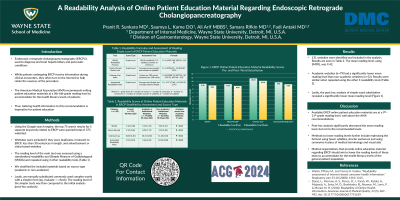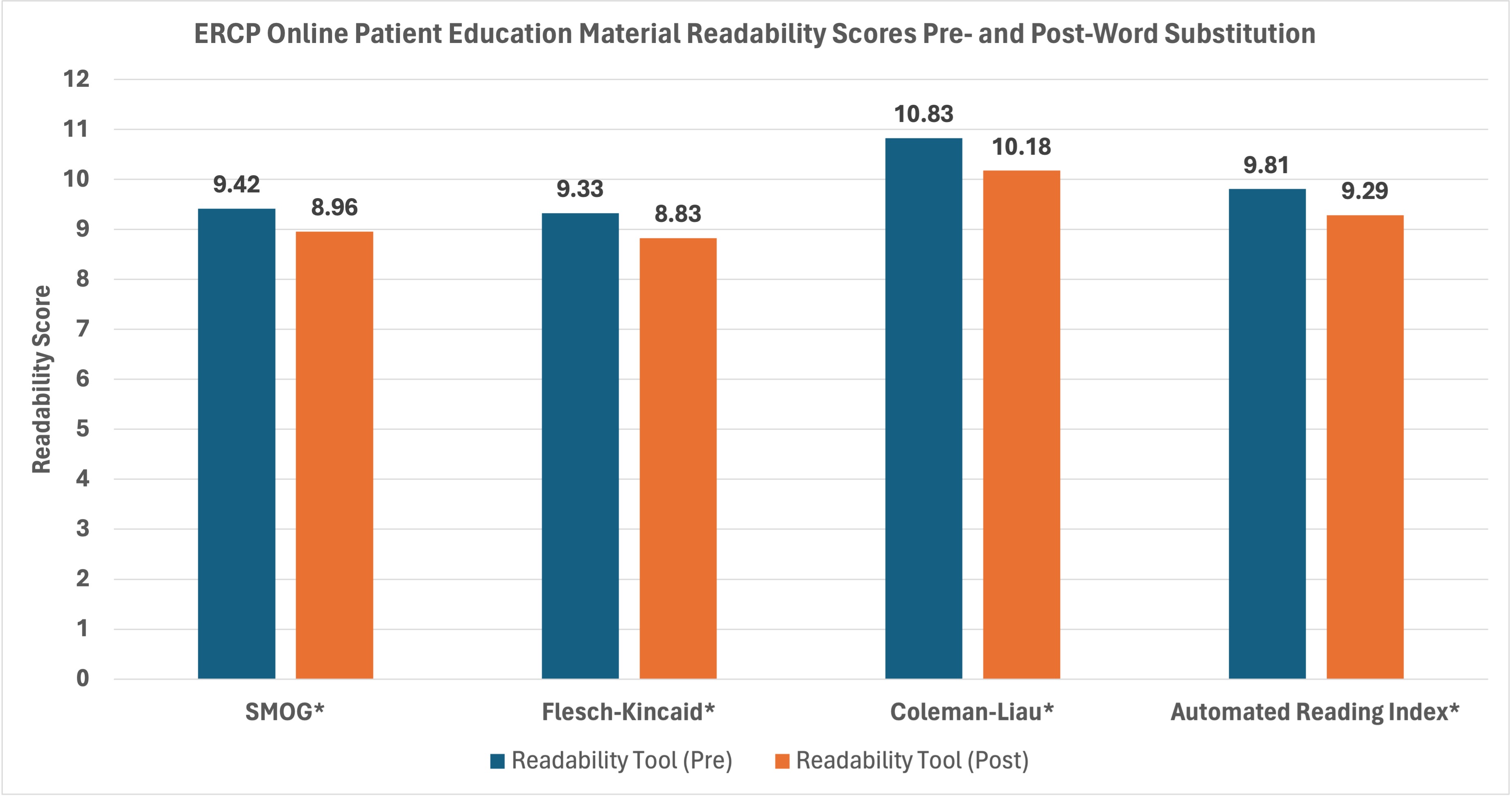Sunday Poster Session
Category: Interventional Endoscopy
P1021 - A Readability Analysis of Online Patient Education Materials Regarding Endoscopic Retrograde Cholangiopancreatography
Sunday, October 27, 2024
3:30 PM - 7:00 PM ET
Location: Exhibit Hall E

Has Audio

Pranit R. Sunkara, MD
Detroit Medical Center/Wayne State University
Detroit, MI
Presenting Author(s)
Pranit R. Sunkara, MD1, Saumya L. Karne, DO1, Ali Arif, MBBS1, Samara Rifkin, MD1, Fadi Antaki, MD2
1Detroit Medical Center/Wayne State University, Detroit, MI; 2John D. Dingell VA Medical Center and Wayne State University School of Medicine, Detroit, MI
Introduction: Endoscopic retrograde cholangiopancreatography (ERCP) is used to diagnose and treat hepato-biliary and pancreatic conditions. While patients undergoing ERCP receive information during clinical encounters, they often turn to the internet to help retain the nuances of the procedure. The American Medical Association (AMA) recommends writing patient education materials at a 5th-6th-grade reading level to accommodate for the health literacy levels of patients. Thus, tailoring health information to this recommendation is imperative for patient education.
Methods: Using the Google search engine, the top 75 search results for 5 separate keywords related to ERCP were queried (total 375 websites). Websites were excluded if they were duplicates, irrelevant to ERCP, less than 30 sentences in length, advertisement or video-based websites. The reading level of the main text was assessed using a standardized readability tool (Simple Measure of Gobbledygook (SMOG). We repeated the same analysis using 3 other readability tools (Flesch-Kincaid, Coleman-Liau and Automated Readability Index). We stratified the included materials based on source type (academic or non-academic). Lastly, we manually substituted commonly used complex words with a simpler form. The reading level of the simpler texts was then compared to the initial analysis.
Results: 131 websites were identified and included in the analysis. The mean reading grade level, using SMOG, was 9.42 (n=131). Academic websites (n=79) had a statistically significantly lower mean reading level than non-academic websites (n=52) (SMOG 9.15 vs. 9.83, p< 0.01). Results were similar when repeated using the other 3 readability tools (Table 1). Lastly, the post-hoc analysis of simple word substitution revealed a significantly lower mean reading level (SMOG 8.96, p< 0.01) (Figure 1).
Discussion: Available ERCP online patient education materials are at 9th-11th grade reading level, well above the AMA recommendations. Post-hoc analysis significantly decreased the mean reading level, but not to the recommended levels. Methods to lower reading levels further include rephrasing the full text using fewer syllables, shorter sentences, using synonyms in place of medical terminology and visual aids. Medical organizations that provide online education material regarding ERCP should aim to lower the reading levels of these texts to accommodate for health literacy levels of the general patient population.

Note: The table for this abstract can be viewed in the ePoster Gallery section of the ACG 2024 ePoster Site or in The American Journal of Gastroenterology's abstract supplement issue, both of which will be available starting October 27, 2024.
Disclosures:
Pranit R. Sunkara, MD1, Saumya L. Karne, DO1, Ali Arif, MBBS1, Samara Rifkin, MD1, Fadi Antaki, MD2. P1021 - A Readability Analysis of Online Patient Education Materials Regarding Endoscopic Retrograde Cholangiopancreatography, ACG 2024 Annual Scientific Meeting Abstracts. Philadelphia, PA: American College of Gastroenterology.
1Detroit Medical Center/Wayne State University, Detroit, MI; 2John D. Dingell VA Medical Center and Wayne State University School of Medicine, Detroit, MI
Introduction: Endoscopic retrograde cholangiopancreatography (ERCP) is used to diagnose and treat hepato-biliary and pancreatic conditions. While patients undergoing ERCP receive information during clinical encounters, they often turn to the internet to help retain the nuances of the procedure. The American Medical Association (AMA) recommends writing patient education materials at a 5th-6th-grade reading level to accommodate for the health literacy levels of patients. Thus, tailoring health information to this recommendation is imperative for patient education.
Methods: Using the Google search engine, the top 75 search results for 5 separate keywords related to ERCP were queried (total 375 websites). Websites were excluded if they were duplicates, irrelevant to ERCP, less than 30 sentences in length, advertisement or video-based websites. The reading level of the main text was assessed using a standardized readability tool (Simple Measure of Gobbledygook (SMOG). We repeated the same analysis using 3 other readability tools (Flesch-Kincaid, Coleman-Liau and Automated Readability Index). We stratified the included materials based on source type (academic or non-academic). Lastly, we manually substituted commonly used complex words with a simpler form. The reading level of the simpler texts was then compared to the initial analysis.
Results: 131 websites were identified and included in the analysis. The mean reading grade level, using SMOG, was 9.42 (n=131). Academic websites (n=79) had a statistically significantly lower mean reading level than non-academic websites (n=52) (SMOG 9.15 vs. 9.83, p< 0.01). Results were similar when repeated using the other 3 readability tools (Table 1). Lastly, the post-hoc analysis of simple word substitution revealed a significantly lower mean reading level (SMOG 8.96, p< 0.01) (Figure 1).
Discussion: Available ERCP online patient education materials are at 9th-11th grade reading level, well above the AMA recommendations. Post-hoc analysis significantly decreased the mean reading level, but not to the recommended levels. Methods to lower reading levels further include rephrasing the full text using fewer syllables, shorter sentences, using synonyms in place of medical terminology and visual aids. Medical organizations that provide online education material regarding ERCP should aim to lower the reading levels of these texts to accommodate for health literacy levels of the general patient population.

Figure: Figure 1. ERCP Online Patient Education Material Readability Scores Pre-and Post-Word Substitution
Abbreviations: SMOG, Simplified Measure of Gobbledygook; * = p< 0.01
Abbreviations: SMOG, Simplified Measure of Gobbledygook; * = p< 0.01
Note: The table for this abstract can be viewed in the ePoster Gallery section of the ACG 2024 ePoster Site or in The American Journal of Gastroenterology's abstract supplement issue, both of which will be available starting October 27, 2024.
Disclosures:
Pranit Sunkara indicated no relevant financial relationships.
Saumya Karne indicated no relevant financial relationships.
Ali Arif indicated no relevant financial relationships.
Samara Rifkin indicated no relevant financial relationships.
Fadi Antaki indicated no relevant financial relationships.
Pranit R. Sunkara, MD1, Saumya L. Karne, DO1, Ali Arif, MBBS1, Samara Rifkin, MD1, Fadi Antaki, MD2. P1021 - A Readability Analysis of Online Patient Education Materials Regarding Endoscopic Retrograde Cholangiopancreatography, ACG 2024 Annual Scientific Meeting Abstracts. Philadelphia, PA: American College of Gastroenterology.

